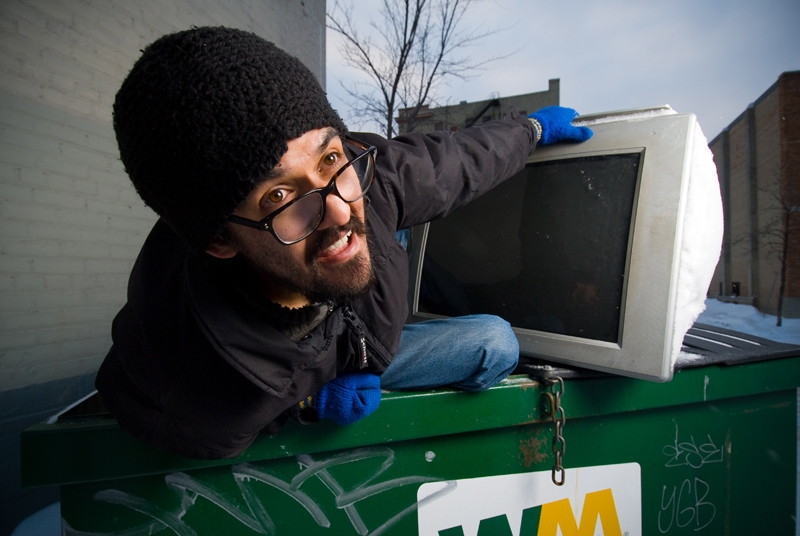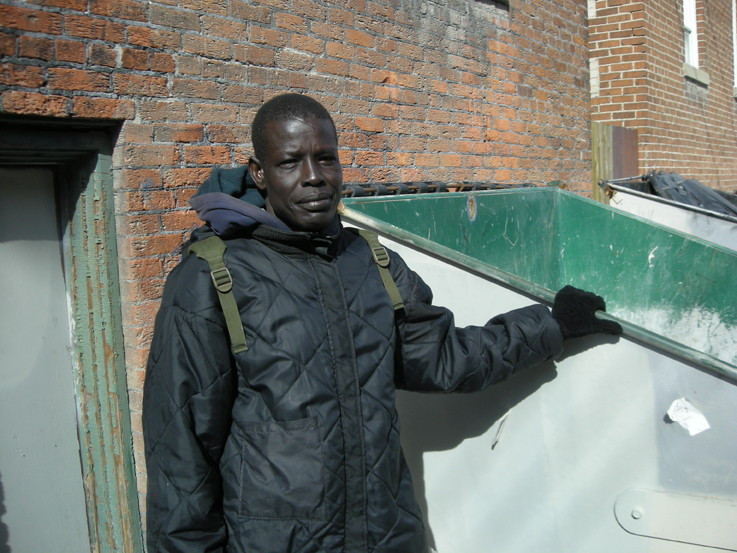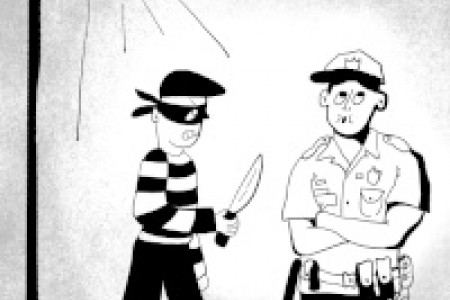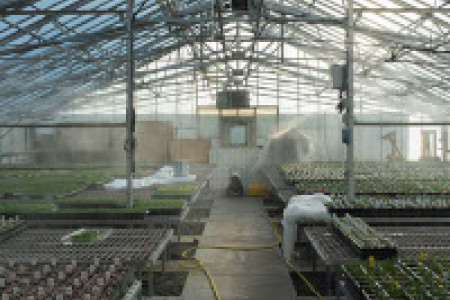The many faces of dumpster diving
From survival to luxury, dumpsters contain it all
Dumpster diving is for anyone. It’s not restricted to the homeless or the destitute.
People do it for a wide variety of reasons. It could be a matter of desperation, or one of convenience. It can be a last resort, or a daily ritual.
People go to dumpsters to look for anything from food to furniture and other potentially sellable items.
One doesn’t go into dumpsters looking for the answers – they do it because they need something.
Sustainable scavenging
Musician and University of Winnipeg alumnus Maria Kucparic dumpster dived for many years while traveling on the road, and even while attending classes.
“I got into dumpster diving while I was a student at the U of W,” she said. “I lived on Kraft Dinner and toast and needed more. I ended up eating healthier out of the dumpsters.”
Friends taught her that she could find fresh produce behind certain stores. She learned which places threw out the best goods and at what times.
The former Harry’s Foods on Portage Avenue used to be one of Kucparic’s favourite places.
“I used to hop on the bus with my big backpack on. I knew Monday night was when they got rid of stuff.”
She would fill that backpack with everything from tofu to big bags of fruit.
She noted that in the winter food would preserve better, but she’d have to time it right so it wouldn’t freeze.
Harry’s Foods was a well-known scavenging spot. When they cleaned off their shelves, there would sometimes be a lineup by the dumpster out back.
“There was lots of competition. In Harry’s we would share and take turns. There was something for everyone,” she said.
Kucparic’s dumpster diving routine had stops at restaurants and bakeries too.
“The Great Canadian Bagel used to throw out huge bags of bagels,” she said.
Kucparic believes that once something is thrown out, it is free for anybody to take. She knows some businesses are more sympathetic to that idea than others.
While Harry’s Foods seemed to not mind people raiding their trash, the Great Canadian Bagel did.
“One time I was right in the dumpster and the owner came out, angry. He said something about how he works hard and nobody should get this stuff for free,” Kucparic said.
She didn’t like that attitude.
“I think it’s a travesty we throw out food,” she said.
“I hope we’ll wake up as a people and realize that throwing stuff out is stupid.”
Kucparic shares this point of view with Signe Knutson, a children’s author from Kellwood, Manitoba.
“If you work for some place and you know there is going to be waste, try to channel it somewhere that’s good,” Knutson said.
Knutson has spent about 15 years dumpster diving in Winnipeg and across Canada.
“There have been times where it was more feasible to get food that way,” she said.
Knutson hasn’t dumpster dived for a few years because she has been working.
She admits that dumpster diving is a necessary act for many, but that it shouldn’t be that way.
“Dumpster diving is not the ideal,” she said. “The ideal is for the people who have the extra food to have another resource for it. Send it to Food Not Bombs or something.”
Knutson also doesn’t like the term dumpster diver. She prefers to say scavenger.
“One of my favourite scavenges was in Montréal. I found a 50 pound bag of carrots with nothing wrong with them.”
Knutson favoured pizza restaurants and donut shops that tend to discard large amounts of prepared food from mixed up orders or unsold products.
“In Victoria, practically all the street people live off of free donuts,” she said.
“ I lived on Kraft Dinner and toast and needed more. I ended up eating healthier out of the dumpsters.
Maria Kucparic, former dumpster diver
Falling short on choice
Akol Yel Agok is a refugee from Sudan, and he’s a dumpster diver.
Agok has yellowed eyes, what teeth he has left are far from white, and his fingertips have been blackened by frostbite.
He has lived in Winnipeg for six years, and relies on the cans he gathers from trash bins to help him survive.
His family is still in Sudan, and he said they are in the same position he is – scrounging for support.
Agok has a Grade 9 education and came to this country knowing nothing about the language or culture.
“As a refugee, looking for my right(s), nothing,” he said in broken English.
Agok is trying to apply for Canadian citizenship so he can qualify for health care and employment insurance. Until then, he scours the alleyways of downtown Winnipeg for beer cans that he can return to vendors in order to buy food.
He lives in a West Broadway Manitoba Housing building where he doesn’t pay rent, but has been collecting cans for over a year for food.
Agok said he has problems with homeless people while he collects cans – there is competition on the streets.
While being interviewed for this piece, another man came walking up the alley, looking into the garbage bins. Agok got scared when he realized he left his bag of cans on the ground beside a bin, and rushed to get it, warning the man not to take them.
His anxiousness is understandable: Without those cans, he wouldn’t be able to buy food for that day.
The man who worried Agok identified himself only as Brian.
Brian, like Agok, collects cans and bottles from the bins. Those aren’t the only valuable things he finds though.
Brian has been able to find small items for his home in the bins. He’s found watches, radios and other small appliances.
Brian said he lives on disability and gets benefits for being a senior, but he still collects cans and other refuse to supplement his meager lifestyle.
He lives with a friend in downtown Winnipeg. He said his lifestyle makes it hard to get an apartment of his own, because he used to be homeless.
“They want to know references. I don’t have any,” he said.
If he got his own apartment, he would qualify for more support from the government and would not have to collect cans.
Brian collects up to $10 worth of cans and bottles on a good day.
He’s not concerned about getting into legal trouble for what he does. If someone is caught going through a dumpster that is on private property, they can be charged with trespassing, however most dumpsters are in public spaces.
“The police know what I do in the alleys,” he said. “They leave me alone.”
Public safety motivates, as well as public need
People have differing views on what makes food inedible.
While some people may be wary of eating an apple with a bruise or drinking milk on its expiration date, some people push those boundaries. People like Kucparic and Knutson know that discarded food is not always spoiled, but just deemed unsellable for one reason or another.
Many businesses consider the food they discard to be unfit for human consumption.
Safeway grocery stores have a policy of locking their garbage bins for safety reasons, said spokesperson John Graham.
“We want to ensure there are no incidents with people getting trapped inside (a dumpster) and food safety issues,” he said. “Some products may have been pulled for health issues. Food that goes to the bin is not fit for consumption or compost.”
He said this policy, while several years old, is not due to any particular incident with a dumpster diver.
According to Graham, Safeways in Winnipeg make efforts to reduce landfill waste by delivering compostable goods to the Rockwood Institute, which does mass composting.
Rumours persist among dumpster divers that some restaurants and grocery stores practice pouring caustic substances on their refuse to spoil it for dumpster divers.
German supermarket chain Lidl issued an apology in 2008 after one of its workers poured cleaning liquids onto the trash to deter dumpster divers, reported Swedish newspaper Mitt i Solna.
Graham said that Safeway has never done this.
Most businesses choose less harsh methods of deterrence, like locking the bins.
Value Village thrift stores have a policy that requires unsellable items to be put into a trash compactor before being thrown away. This also prevents people from getting for free that which they could be buying inside.
Anil Nayar, the manager of Value Village on Ellice Avenue, said they try to recycle as much as they can to reduce what goes in the dumpsters, which are locked based on a Canada-wide policy.
Before that policy was in place, the Ellice location had a highly trafficked dumpster.
“We’d come in the morning and there would be a huge mess. Waste of our time cleaning up,” Nayar said.
Besides the concern about mess, safety is an undeniable factor, Nayar said. He has never seen someone hurt at his location, but he’s heard stories, such as one about a man who was injured after falling asleep in a Value Village dumpster. That person avoided the compactor, but not some broken glass and other sharp materials.
Looking to balance the scales
Some people dumpster dive because they feel guilty about the waste produced by western society.
Lin Seller doesn’t fit the image of the typical dumpster diver. She has a home, a job and a vehicle.
You’d have a hard time finding her waist-deep in garbage juice someplace downtown; she would rather scan back alleys from her car in areas where people consider it easier to throw things out than find someone to donate them to.
She enjoys seeing what people consider garbage.
“It’s almost my own sociology experiment,” she said. “It’s amazing what people throw away that is still perfectly good and useful.”
Seller is used to finding objects for her Corydon-area home in the alleyways.
She found a working computer complete with accessories in St. James, which she kept for herself.
She also found antique furniture in Charleswood and framed artwork and mirrors in the Corydon area, some of which she sold.
She’s scavenged power tools, electronics, patio furniture and countless other items in her alleyway explorations.
Seller is moved to reappropriate suburban trash by many factors. Mainly, she gets disheartened by the waste many stores produce.
“Every retail store I’ve ever worked in throws out some sort of useful thing on a regular basis,” she said.
Her way of feeling better about creating such waste is to help others produce less, whether they know it or not, by taking their garbage.
“It’s kinda like garage sale-ing… but free.” she said.
Bill Beso also sells what he finds in dumpsters.
“I made a living by dumpster diving, finding stuff to sell on e-Bay,” he said.
He has dumpster dived since he was a kid in Fort Richmond. He said he started just to have something to do when he was bored.
“If my parents ever knew that I was in a dumpster they would be eternally shamed,” he said.
Beso works at the St. Regis Hotel in downtown Winnipeg. Since he’s worked there, he’s seen the hotel go from having open dumpsters to locking them up.
He said the change was mainly due to one inconsiderate dumpster diver.
“This one guy was always in it (the dumpster),” he said. “I’ve hit him a few times with bags I was throwing away at the end of the night.”
Sympathetic businesses
While some businesses like Value Village and the St. Regis hotel find it easier to just lock everything up, others try to find the balance between keeping clean and safe, and being able to help people.
The Ellice Café & Theatre (ECT) is one such restaurant.
“We have people who come in here who need a bit extra,” said Belinda Squance, manager of the ECT. “We will give it to them.”
The ECT keeps their dumpsters locked up inside the restaurant due to space issues in the alley. Even if they were outside, they would still be locked, Squance said.
“I often see a huge mess at the nearby 7-11 (by the dumpsters),” she said.
In addition to the mess, the West End area sometimes has fires set in the dumpsters, making them a potential liability.
Squance has also seen how other people tend to use a business’ dumpster for their own trash, generating extra fees for the cleanup.
But the ECT does dispose of their food waste through the Spence Neighborhood Association’s composting program.
The workers at the Organic Planet food co-operative in Wolseley are vividly aware of food waste issues and the people who could benefit from them.
“We would never lock our bins. That would be ridiculous,” said Jan Guenther Braun, co-op member. “We will put (usable) stuff out there if we can, beside the bins.”
Organic Planet composts as much food waste as they can, and wants to encourage other grocery stores to manage their produce better so waste is minimal.
“You can stay on top of your vegetables if you go through them daily,” Guenther Braun said.
Organic Planet tries to help hungry people directly.
“We have a policy that if someone comes in and asks for food, we give it to them.”
Gunns Bakery just off Main Street on Selkirk Avenue has a similar attitude. There are many people who regularly check dumpsters in the area.
Gunns keeps their dumpsters in their locked yard, but make sure to minimize how much edible food goes to waste.
“The stuff that goes to the garbage is unbaked dough or scraps,” said Arthur Gunn, co-owner of the bakery. “Anything that’s baked goes to the soup kitchen at Siloam Mission.”
Gunn likes being able to help people in need, but he knows where to draw the line.
“If someone’s hungry, you give them something. If you can see there’s a need you can’t refuse them. If someone came in demanding something to eat, it would be less likely,” said Gunn.
The final word
From a public health perspective, the main concerns with dumpster diving are prevention of injuries and communicable diseases, said Dr. Sandee Harlos, medical officer of health for the Winnipeg Regional Health Authority (WRHA).
There’s also a small chance of coming into contact with toxic substances, when they’re not disposed of properly.
Harlos advises people to wear gloves and use tools rather than bare hands when scavenging dumpsters.
If someone was to go into dumpsters frequently, Harlos advises them to make sure their tetanus shots are up to date. In general, shots are given every 10 years.
One real concern is from needles. Getting stuck with a dirty needle is a danger when you can’t see what you’re handling from a dumpster.
This can lead to Hepatitis B and other blood-borne diseases. H.I.V. and Hepatitis C do not survive long outside the body, so the risk for them is less.
Harlos said that bacterial contamination is a possibility if one chooses to eat food from a dumpster.
“You don’t know what happened to it before it went to the dumpster. Even colder temperatures don’t kill all bacteria,” she said.
She advises caution when gathering food from dumpsters.
“You can wash produce effectively, and a small amount of bleach in the water can help,” she said.
She cautions that meats and milk products are likely to be spoiled and unfit for human consumption.
Although it presents many health risks, most scavengers believe dumpster diving will exist as long as waste is generated.
“There’s always a value to other people’s junk,” Beso said.
Published in Volume 63, Number 26 of The Uniter (April 2, 2009)








